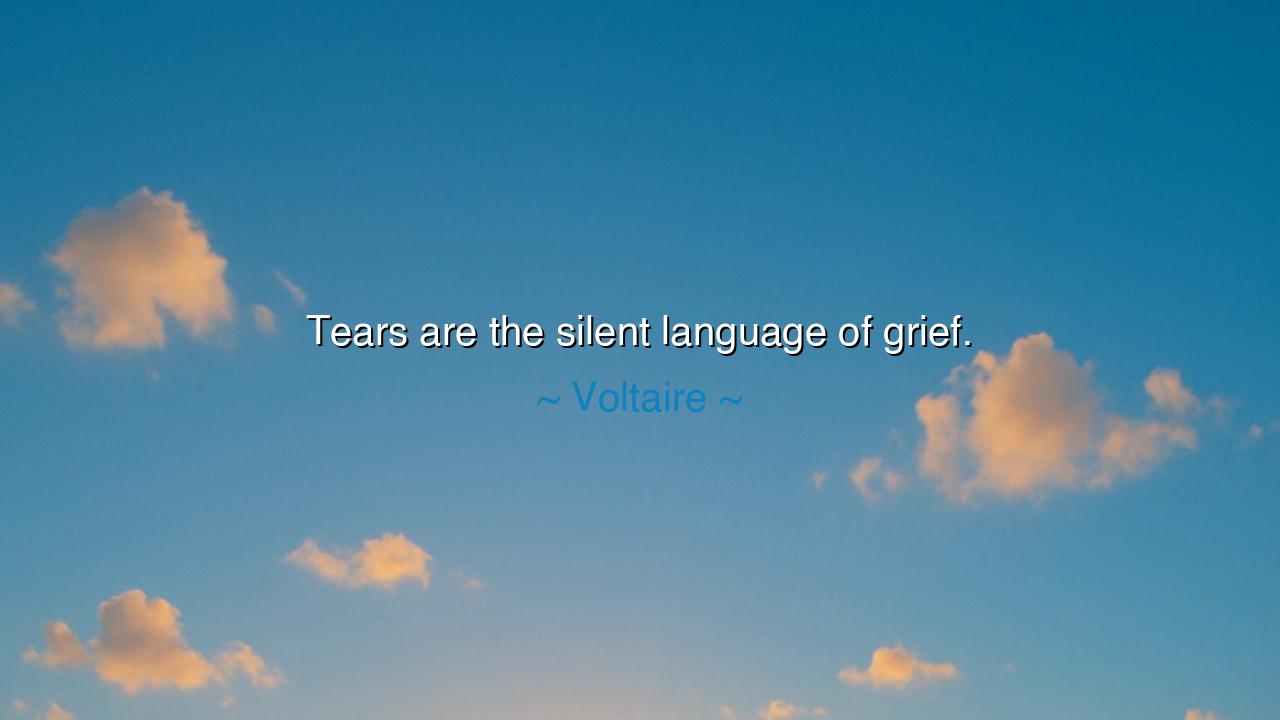
Tears are the silent language of grief.






“Tears are the silent language of grief.” Thus spoke Voltaire, the great voice of the Enlightenment, whose pen often pierced hypocrisy, but here turned tender toward the heart’s hidden sorrows. In these few words lies a profound truth: when the weight of suffering grows too heavy for speech, the body finds its own tongue, and that tongue is the tear. Tears are not weakness, nor are they shame—they are the soul’s most ancient script, a sacred writing upon the face that declares sorrow without sound. Where words falter, where speech cannot contain the enormity of loss, tears flow as the purest testimony of grief.
The ancients themselves knew this language well. In Homer’s Iliad, mighty warriors—men who shook the earth with their spears—were not forbidden to weep. Achilles, greatest among them, shed tears over the fallen Patroclus, and later, when Priam clasped his knees and begged for the body of Hector, both men wept together, enemies united in the silent speech of sorrow. Tears in that moment became the bridge where grief spoke louder than war, where silence bore more power than speeches of kings. Thus, the wisdom is clear: grief is universal, and its silent language needs no translation.
Voltaire himself was no stranger to sorrow. Behind the wit and fire of his words lived a man who endured profound loss, including the death of those he loved dearly. In this quote, we hear not only philosophy, but lived experience. He knew that grief often resists the prison of speech. A mourner may try to articulate the agony of absence, yet the tongue stammers and falters. Tears, however, betray nothing false; they flow with an honesty that no rhetoric can equal. In tears, grief finds truth.
History, too, gives us countless examples of this truth. Consider Abraham Lincoln, whose eyes brimmed with tears at the death of his young son Willie. The president, whose voice rallied a nation in its darkest hour, found himself unable to speak the depth of his loss. Those who saw him noted not his eloquence in that moment, but his quiet weeping. And yet, in those tears, the weight of his grief was understood more fully than words could ever tell. Through silence, his sorrow spoke, and in speaking, it humanized even the leader of a fractured land.
From these tales we learn that tears are not weakness, but power concealed in gentleness. They are the body’s confession, unguarded and true, a release that both honors the pain and begins the path toward healing. A man or woman who weeps shows not frailty but courage—the courage to stand unveiled before the world and let grief be seen. For silence has many forms: the silence of repression, which is deadly, and the silence of tears, which is life-giving.
Let us not despise this language, then, but honor it. When you encounter one who weeps, do not demand words, for words may wound where tears are already sufficient. Instead, be present, be gentle, and let your own silence join theirs. In doing so, you will speak more comfort than any crafted phrase. Grief needs witness more than explanation, companionship more than counsel.
The lesson is plain: allow yourself the freedom of tears. Do not bury grief beneath the weight of pride or the armor of false strength. To cry is to acknowledge love, for tears are born of attachment, of memories, of bonds too sacred to vanish without pain. And in the same breath, offer others the sanctuary of your understanding when they too are overcome.
Thus, remember Voltaire’s wisdom: “Tears are the silent language of grief.” It is a language spoken by all, regardless of age, nation, or creed. It is the common speech of humanity in its most vulnerable hour. Learn to speak it without shame, to read it without judgment, and to honor it as one of the soul’s most profound truths. In this way, grief is not borne alone, but shared, and through sharing, begins the long journey toward peace.






AAdministratorAdministrator
Welcome, honored guests. Please leave a comment, we will respond soon